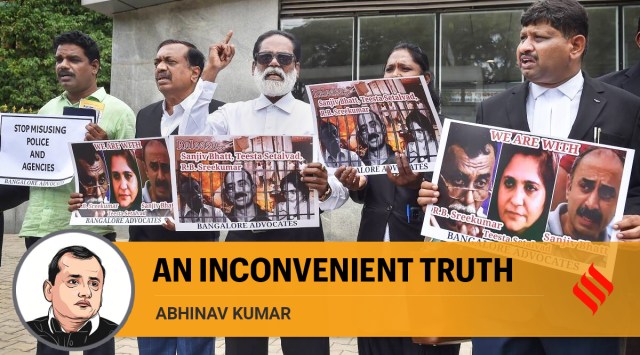
I don’t know whether to laugh or cry at the outpouring of concern and outrage over the arrest of Teesta Setalvad. I wish a similar sense of anguish was felt for our own Rajendra Kumar, then, joint director, Intelligence Bureau, Gujarat, and the entire Gujarat Police team when a bona fide intelligence operation was cynically projected as an extra-judicial killing to “fix” the then chief minister and home minister of Gujarat in the Ishrat Jahan case. Setalvad and others have scarcely shown any scruples in pursuing their self-righteous moral agenda. The wheel in this case has come full circle, that’s all.
On the larger issue of fixing responsibility for the Gujarat riots, I think the problem is structural. Large-scale breakdowns of public order, whether one-sided like the anti-Sikh riots of 1984, or those with victims from all sides like post-Babri Masjid riots in 1992-93, or in Gujarat 2002, are failures of systemic proportions involving hundreds if not thousands of individuals, who are both state and non-state actors. We seem to place too much faith in the ability of two or three individuals in key positions to engineer or prevent such incidents. I suspect that the reality is less dramatic.
We simply lack the institutional capacity, the national character and the political and cultural appetite to prosecute such riots with any kind of moral clarity that seeks justice for individual victims. It is a sad reality that our democratic institutions are, all too frequently, overwhelmed by irrational faultlines of identity, based on religion, caste, ethnicity and language. Brushing these recurring outbreaks of violence under the carpet will always remain a more convenient and, therefore, default option. This is an inconvenient truth about our state and civil society that must be comprehended before it is confronted or cured.
Our persistent failure to deliver justice in the aftermath of large-scale communal violence and the breakdown of public order ought to be a cause of concern for the health of our democracy and civil society. But this is less a problem that can be laid at the feet of a particular ideology. It is caused more by the lack of institutional capacity and collective intent. Our criminal justice system is simply not equipped to meet these noble expectations. Fixing it would require a sustained investment of both resources and our moral imagination. It is a frustratingly slow work-in-progress.
Regrettably, for far too long, the public discourse on communal riots has been hijacked by a rather odious, ill-informed moral posturing by self-styled guardians of our secular and liberal values. A completely false, and I might add irresponsible, sense of moral equivalence between Jihadi Islam and Hindutva ideology forms the foundation of this posturing. In its more fanciful variations, we see over-the-top comparisons of Hindutva ideology with Nazism by shrill, tone-deaf public intellectuals. Such comparisons simply showcase their own ignorance and prejudice. The casual manner in which comparisons between Hindutva and Fascist ideology are made in our public debates is intellectual hypocrisy of the worst kind. I suggest that all these self-styled guardians of our liberal values first go back to school and read up to comprehend the enormity of evil that Fascism actually represented in 20th-century history. If they did, then perhaps they would realise that any such comparison represents an incredible poverty of both moral and intellectual imagination. It is hardly surprising that all this moral and intellectual posturing has had little impact on political and judicial outcomes.
Our public intellectuals on the left are remarkably passionate and eloquent in their defence of liberalism, secularism and socialism. But as with most intellectual fads, they fail to acknowledge that these supposedly universal values are themselves resting on ideological foundations that are anything but universal. To privilege the individual rational self as the primary concern of political morality and the constitutional order is a recent conceit of our collective imagination.
History suggests that human identity finds nourishment from many sources. The rational, self-interested self, is merely one of them. No constitutional order can inculcate liberal values if they are not sustained by consensual cultural and social practices. Tolerance and diversity survive and thrive in India, albeit imperfectly, not through constitutional compulsion but through conscious cultural choices to coexist in peace. The alleged contradiction between Hindutva and our constitutional values is a deeply cynical and intellectually bankrupt political stance.
For two decades, Setalvad and those backing her took a purely political stance on the Gujarat riots and tried to sell it as a moral and legal imperative. Shame is no doubt an extremely powerful tool of political rhetoric. But only if it is grounded in objective reality. The left has never shied away from hyperbolic absurdities to mobilise public opinion. Such flawed narratives always come with a sell-by date. In the Gujarat riots, over the last two decades, the political and legal processes have not gone in the favour of Setalvad and her supporters. Alas, only moral outrage remains. It may sound harsh but I find it difficult to shed a tear for such cynical activists who, in the pursuit of their political objectives, didn’t think twice about crucifying my colleagues in the police and intelligence community.
The writer is a serving IPS officer. Views are personal